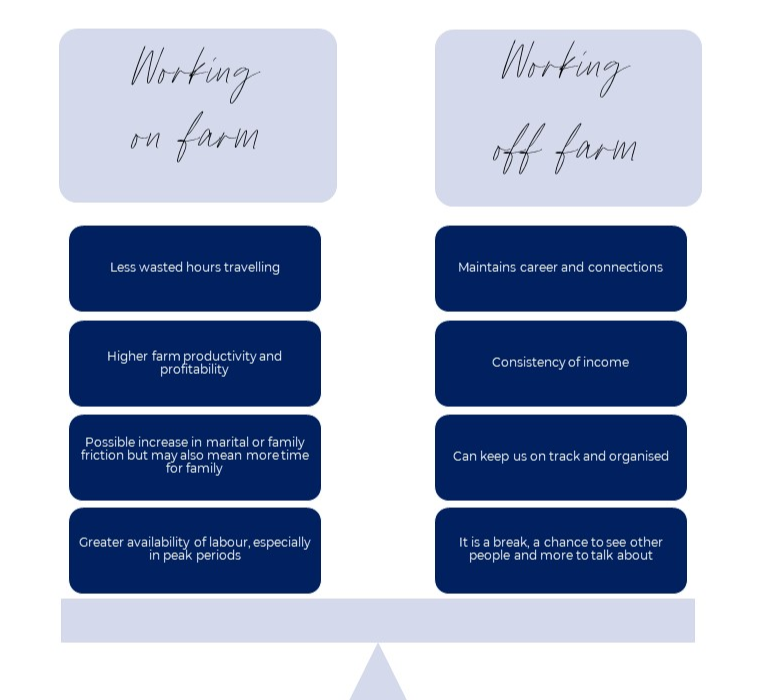It’s an issue for so many farming families, do we work off farm for a ready supply of cash? Or do we work on farm for possibly more job satisfaction, however potentially uncertain and hard to measure financial rewards?
Is working on farm going to support our family relationships, or add more tension and strain? The current labour shortages are bringing the issue to a head once again in some farm businesses.
I had the pleasure of talking to Kirsten Diprose for the Ducks on the Pond podcast recently where we had a good chat about how working within a family farming business can compare to working outside it. Listen to it here.
It’s not just the ladies facing this issue, we all know blokes on farms who are also shearers, truckies, tradies, teachers, stock agents, agronomists, bankers or fly-in-fly out miners. Some families have adult children who work on and off farm and are re-examining the balance.
Let’s look at the pros and cons.

Your pros and cons might be different, whatever you choose to prioritise, here are some tips for making it work...
If you prioritise on-farm work
-
You need to put a value on your work. Count the savings in labour paid for, count the productivity gains in increased yields, better pasture management, clever marketing or lower R&M bills.Count the cost of missed opportunities.
-
You need to be paid FULL STOP. Have a talk about how this will work. Spend some time identifying your goals as a farming family and work toward them.
-
Couples with combined finances may still benefit from having separate accounts for some things. Many women I know have mentioned that they work for financial independence, but also a sense of financial privacy and self-determination. The Barefoot Investor, Scott Pape talks about setting aside a “Splurge” bank account for all of life’s necessary indulgences. His and Hers splurge accounts (separate from farm and family money) might be one way to address this issue.
-
Recognise the social aspect that work often provides and build something back in. For some people it’s structured social time such as a sporting group, volunteer involvement or a yoga class.
-
Outline areas of responsibility within your farming family business and any training that needs to take place. It’s good for everyone to have autonomy in decision making at a defined level. There’s not a lot of job satisfaction in continually being the gopher.
-
Don’t ignore superannuation, it’s one of the great benefits of off farm work.
-
Income protection insurance may also be a consideration as you don't have sick leave. It's ok for the odd flu, but might be a concern with regard to the big C. Remember if you are self employed as a sole trader or partnership you are not covered by workcover. Talk to a professional.
-
Housework needs to be a shared responsibility. The family might have lived in this house since 1921, but it is the 21st century and all work has value.
If you are prioritising off-farm work
-
Own it as a choice. Fill in the blank in this sentence “I choose to work off farm so I can……” Not "I have to work off farm".
-
If your long-term goal is to be farming full time, set some criteria an end date or a date for revision.
-
Make sure you have the most appropriate business structure. Consider things like carried forward losses and Family Tax Benefits. Professional liability and asset protection may be an issue for some. Make sure your accountant knows what your goals and plans are.
-
You only have so many hours in the day. You will have to accept help, outsource some tasks, be more organise or use contractor. If you are looking for training in this area www.housepaddockconsulting.com.au are great.
-
Minimise travel where possible by working from home part of the time if you can. However, don’t work from home with little kids about. You can’t do both things at the same time.
-
Don’t over commit. Not to work, not to the farm, not to extra-curricular activities for you and the whole family. You need to have a bit of slack in the system so that if the dishwasher breaks down, the sheep get out again and there is a bad case of gastro in the household it doesn’t bring you to the edge of a mental breakdown (true story).
-
Don’t use all of your holidays to catch up on farm work or for peak on farm periods, you also need to structure time away from the farm.
-
Determine what the main challenge or advantage of working off farm is, and make sure your work addresses this. So, if the most important thing about working of farm is the social contact, get a job that gives you this. If the most important thing is the money, perhaps finding higher paid work is more important than the social side. If the greatest challenge is getting things done on farm or for your family, prioritising off farm work with low and predictable hours, or flexibility is possibly more important than other aspects of job satisfaction.
Have some conversations with your nearest and dearest, talk to a professional, do your sums and follow your heart.
There is no one size fits all approach and family life stage and your stage in the business life cycle has a lot to do with it.
Most importantly, things change all the time. Be prepared to change with them.
Carmen Quade is a farmer based in Tallimba NSW who also runs AgriFocused, an agribusiness training firm specialising in business skills for farmers.
To find out more about AgriFocused visit their website below.
 Results
Results

